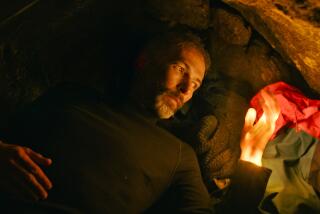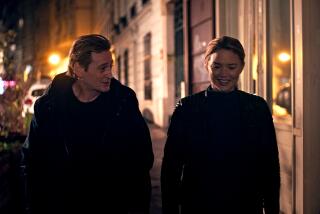Capturing the soul of ‘Paris’
- Share via
For French auteur Cedric Klapisch (“When the Cat’s Away . . .,” “L’Auberge espagnole”) the success or failure of his new film, “Paris,” came down to a question of real estate.
To make his love letter to the City of Light work, Klapisch had to find just the right apartment -- with a balcony, of course -- where his protagonist, a dancer named Pierre (Romain Duris, in his sixth film with the director) could watch working-class denizens go about their daily lives.
Klapisch found his ideal flat “very close to the Pere-Lachaise Cemetery,” says the 48-year-old filmmaker on the phone from New York City. “I needed his apartment to look over the city from a high angle and look at the cemetery at the same time. I wanted to show the vivid side of Paris and the cemetery. There were like three places in Paris that would have those two things.”
In the film, which opened in L.A. theaters on Friday, Pierre suffers from a serious heart disease and is awaiting a transplant; the only way he can feel part of the pulse of Paris is to stand outside on his balcony. Juliette Binoche plays Pierre’s sister, who moves into this apartment with her three children to take care of him. The ensemble piece also features Fabrice Luchini as a Parisian history professor, Francois Cluzet as his modern architect brother and Melanie Laurent (“Inglourious Basterds”) as a flirtatious college student.
Klapisch created several themes he wanted to explore about the city and fashioned his characters around the themes. “If I wanted to describe Paris, fashion had to be there, the intellectual way of thinking had to be there, immigration had to be there,” he says. “I liked the opposition between modernity and history. We have a specific relationship to bread and pastries in Paris, so I had to have a baker in the movie. I couldn’t speak about Paris without speaking about cafes, so there are a lot of scenes in cafes.”
The drama has its roots in reality, as Pierre was based on a man whom Klapisch once met who was taking a taxi to the hospital and didn’t know if he could come back. “He was looking at the people in the streets saying to himself that all of those people were so lucky because they were able to walk in the street,” Klapisch says. “That story struck me so much I wanted to use that in the movie.”
Though Paris has gone through enormous transformation over the decades, Klapisch says “you really can’t destroy the soul of Paris. Everything is renewed and pretty well-preserved. It’s a combination of modernity and old things and the two sides are important for each other. I think that’s really proof that a city if vivid if it can create new things.”
If some Americans think Parisians are boorish and snobbish, then Klapisch hopes that his humanistic film can challenge those stereotypes.
“I think it’s a question of your own attitude about how people react,” the director says. “Very often they are friendly when you spend time with them, not the minute you meet them. It’s the opposite of California where you enter a store and someone smiles at you and says ‘Hello.’ That doesn’t exist in Paris.”
--
More to Read
Only good movies
Get the Indie Focus newsletter, Mark Olsen's weekly guide to the world of cinema.
You may occasionally receive promotional content from the Los Angeles Times.








